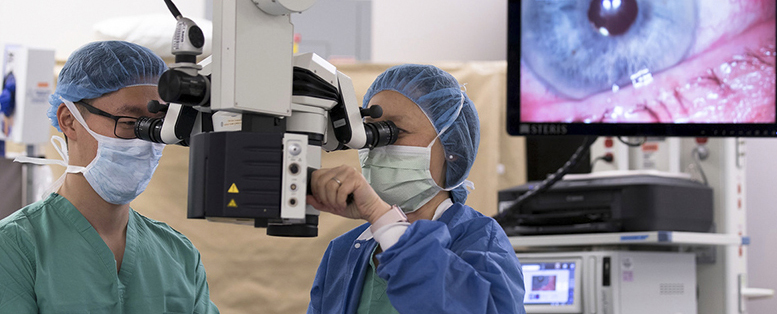Clinical Curriculum

As of the 2021-2022 academic year, our ophthalmology residents will complete an Integrated Internship at the UC Davis Health System. During this year, our interns spend three non-contiguous months on the ophthalmology service where they are introduced to our comprehensive service, spend time on select subspecialties, and participate on our inpatient consult service. Interns also attend ophthalmology didactics during their ophthalmology blocks and have dedicated wet labs geared towards preparing them for their PGY2 year. Our interns also have rotations in facial plastics, otolaryngology and neuro-radiology – services that overlap with ophthalmology and add an important dimension to the ophthalmology training. The remainder of the year is spent on the inpatient and ambulatory medicine services at UC Davis and its affiliated institutions.
Comprehensive Ophthalmology: PGY-2 residents spend 18 weeks on the comprehensive service, working one-on-one with our outstanding faculty in comprehensive ophthalmology. In addition to extensive clinical experience, the residents also participate in cataract surgery, often performing between 10 and 20 primary surgeries before the end of the PGY-2 year. Early surgical experience is a cornerstone of the UC Davis training program, allowing our residents to learn excellent techniques early on and build on their skill set throughout their training.
Consult service: PGY-2 residents spend three months on the inpatient consult service. Under the supervision of the chief resident and clinical faculty, the consult resident performs independent examinations and develops treatment plans for both urgent and emergent patients in the emergency room and on the inpatient units. As UC Davis is a Level 1 trauma center, our consult residents see a wide range of pathology and are well trained to manage a variety of ocular emergencies.
Neuro-ophthalmology: Three months of the PGY-2 year are spent on the Neuro-Ophthalmology Service. As part of the neuro-ophthalmology service the resident will learn how to thoroughly work up, diagnose and manage patients with complex neuro-ophthalmic disorders.
Oculoplastics: PGY-2 residents spend six weeks on the oculoplastics service during which they participate in the clinical and surgical management of disease processes of the orbit, lacrimal system and eyelids. Residents on this service also rotate with our affiliated volunteer clinical faculty at the Kaiser Folsom site. Through these experiences, residents gain significant operative and clinical experience on which they build in their final year.
Veterans Administration Medical Center, Mather: This three month rotation at one of our two VA hospitals provides second year residents with a solid foundation in medical and surgical ophthalmology with an emphasis on cataracts and glaucoma. VA faculty provide direct one-on-one instruction in the OR, allowing the residents to deepen their understanding and experience of cataract surgery. Residents on this rotation learn to work independently, managing their own clinics with close faculty supervision.
Cornea and External Disease: Three months of the PGY-3 year are spent on the cornea and external disease service, during which the resident is exposed to a wide range of complex clinical and surgical pathology. The resident is a vital member of the team, participating in clinical work, surgical cases and minor procedures.
Glaucoma: Three months of the PGY-3 year are spent on the glaucoma service, working in the clinics and operating rooms with the three full time glaucoma faculty. During this rotation, residents learn the workup, medical management and surgical approaches to various forms of glaucoma in both children and adults.
Pediatric Ophthalmology and Adult Strabismus: Three months of the PGY-3 year are spent on the pediatric ophthalmology and adult strabismus service. Residents participate in the diagnosis, medical management and surgical treatment of a wide range of pediatric ocular disorders including strabismus, nasolacrimal duct obstruction and congenital or developmental cataracts. Residents also participate in the management of adult patients with strabismus.
Chief Resident Rotation: Senior residents spend three months on the Chief Resident rotation. This rotation provides residents with the opportunity to serve as autonomous comprehensive ophthalmologists, to refine their leadership and management skills and to develop surgical maturity before completing the residency. Residents manage their own clinic workflow, schedule patients for cataract surgery with faculty oversight, and perform cataract surgery with supervision by our anterior segment faculty.
Veterans Administration Medical Center, Martinez: UC Davis is unique in having two VA experiences for its residents, and the Martinez VA is the site of the second of these experiences. This three-month rotation offers residents an excellent opportunity to expand their knowledge and expertise in a broad spectrum of medical and surgical ophthalmologic areas. Under direct faculty supervision of the Chief of Ophthalmology at the Martinez VA, the resident runs his/her own service with a focus on anterior segment and cataract surgery.
Vitreoretinal Service: Three months of the third year are spent on the Vitreoretinal Service. The resident will participate in the diagnosis and management of patients with a wide variety of vitreoretinal disease and ocular tumors. Residents become adept at performing laser treatments and intravitreal injections, and participate in the surgical treatment of patients with retinal disease as well.
Advanced Comprehensive Ophthalmology: Senior residents return to the comprehensive service for six weeks to consolidate their clinical and surgical skills in cataract and refractive surgery. This is an opportunity to build on their foundational skill set and learn more complex techniques in cataract surgery, including use of the ORA system, LenSx, and the management of post-refractive patients. Residents also participate in refractive surgery at the David Grant Medical Center in Fairfield.
Advanced Oculoplastics: Senior residents return to the oculoplastics service for six weeks to consolidate their training in the medical and surgical management of orbit, eyelid and lacrimal disorders.
